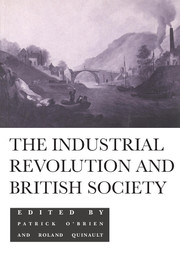Book contents
- Frontmatter
- Contents
- List of contributors
- Preface
- 1 Introduction: Modern conceptions of the Industrial Revolution
- 2 Women in the workforce
- 3 Reinterpretations of the Industrial Revolution
- 4 Religion and political stability in early industrial England
- 5 Sex and desire in the Industrial Revolution
- 6 Political preconditions for the Industrial Revolution
- 7 Crime, law and punishment in the Industrial Revolution
- 8 The Industrial Revolution and parliamentary reform
- 9 Margins of the Industrial Revolution
- 10 Social aspects of the Industrial Revolution
- 11 Technological and organizational change in industry during the Industrial Revolution
- Postscript: An Appreciation of Max Hartwell
- Index
4 - Religion and political stability in early industrial England
Published online by Cambridge University Press: 05 June 2012
- Frontmatter
- Contents
- List of contributors
- Preface
- 1 Introduction: Modern conceptions of the Industrial Revolution
- 2 Women in the workforce
- 3 Reinterpretations of the Industrial Revolution
- 4 Religion and political stability in early industrial England
- 5 Sex and desire in the Industrial Revolution
- 6 Political preconditions for the Industrial Revolution
- 7 Crime, law and punishment in the Industrial Revolution
- 8 The Industrial Revolution and parliamentary reform
- 9 Margins of the Industrial Revolution
- 10 Social aspects of the Industrial Revolution
- 11 Technological and organizational change in industry during the Industrial Revolution
- Postscript: An Appreciation of Max Hartwell
- Index
Summary
Historians, like other detectives, deal with facts. But establishing the facts is often a matter of supposition and conjecture, of adducing and testing hypotheses. The relationship between religion and politics in early industrial England is a case in point. The fact is that many informed observers, contemporaries of the early industrial period as well as later historians, have considered the political stability of the society remarkable in an age when scarcely any other society in Europe avoided serious political violence. It is also a fact that England during the late eighteenth and early nineteenth centuries had flourishing and variegated traditions of religious dissent without parallels in contemporary Europe. It has been a matter of frequent supposition – also by contemporaries as well as later historians – that these two things were related. This study revisits the intriguing hypothesis that a unique religious culture somehow meliorated the threat of serious political instability and violence in early industrial England.
That threat exemplified the truth that for every generation the future remains open, inescapably hypothetical in its myriad possibilities and probabilities. It also illustrated the way in which unrealized hopes and fears help shape the course of history. The spectre of an English political revolution, and the possible futures it implied, shaped political agendas, social developments, public policies and private behaviour in numerous ways during the early industrial age.
- Type
- Chapter
- Information
- The Industrial Revolution and British Society , pp. 79 - 99Publisher: Cambridge University PressPrint publication year: 1993



